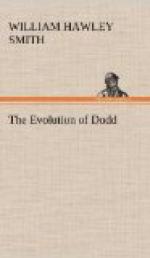Meanwhile the school saw the situation and began to enjoy it hugely, though now at “Dodd’s” expense.
Presently the young man looked up from his work and, glancing quickly to the teacher, saw that he was fairly caught. Like lightning he swept the brush, which he held in his left hand, over the picture, and it was gone. Then he squared himself in his seat.
But it was too late. He had overshot the mark. He heard a sneer of disgust from the pupils instead of the laugh he had counted on. He was down again. He was vexed at the result, and his face drew on an air of injured vexation, after the manner of his kind.
Then Mr. Bright said, stepping down to “Dodd’s” desk, and speaking in a low tone, to the boy only:
“The picture was very good; very much better than I could have made. I see you have a good deal of ability with the chalk; I am glad to know it. If you care to try your hand on the board, you are welcome to do so at any time; only please do not try to take the attention of the pupils from their studies by your pictures, as you did just now,” and without another word he resumed the point under consideration when the interruption took place.
“Dodd” tried to look defiant, but to little purpose. There was nothing left to defy.
I have seen men strike so hard at nothing at all that they have fallen headlong themselves, dragged down by the force of the blow they had intended for another. “Dodd” was down, and it was his own hand that had put him there.
And it is so much better that way!
Yet two points had been gained by this encounter. Mr. Bright had discovered that “Dodd” had a genius for one thing at least, for the sketch was really a remarkably strong one—so strong that the subject of it would have been glad to have preserved it; and “Dodd” was fully convinced that he had no ordinary man to deal with in the person of Mr. Charles Bright. With these two new points developed, the party at the reel end of the line began slowly to “wind up,” yet again, and the party of the second part let him wind.
CHAPTER XIII.
Rome was not built in a day nor is a character formed in one round of the sun. A man never reaches a great height at a single stride, and many times he slips and falls back, even after he has been climbing a great while. This is a thing that is common to the race.
“Dodd” Weaver possessed this trait. I say that he did, and shall proceed to prove it, in two ways, which I plainly state for the benefit of the two classes of people who can only see the same set of facts from opposite points of vision.
For the practical people, those who believe only what they see,—the unimaginative and severely scientific, if you will,—I present in proof of the proposition stated above, the record of the boy’s life up to this point—the bare facts that have transpired. For those who bow down at the shrine of pure logic, who accept no conclusion but such as has been hoisted into place by a lever of syllogism, with a major premise for a fulcrum, and a minor premise on the long end of the bar,—for these, I submit the familiar form:




